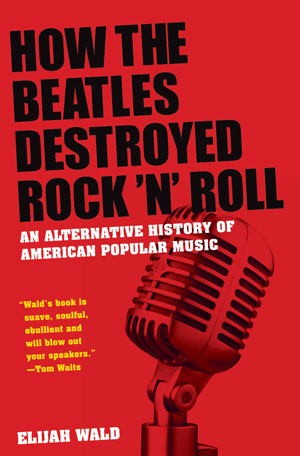
 How The Beatles Destroyed Rock ’n’ Roll by Elijah Wald
How The Beatles Destroyed Rock ’n’ Roll by Elijah Wald
(Oxford University Press, 2009)
Review by Belmont professor Don Cusic:
This isn’t really a book about the Beatles; rather it is a book that notes the distortion of the history of popular music through the years. Wald, who wrote an excellent book on Robert Johnson, notes that histories of rock ’n’ roll—or the music industry in general—tend to be written by guys who like cutting edge music much more than “popular” music. For example, Paul Whiteman was the most commercially successful early jazz big band leader, but historians ignore him in favor of Louis Armstrong and Duke Ellington (who both admired Whiteman) because 1) Whiteman was white and 2) he was commercially popular.
Once the party line is established, other writers tend to follow it.
This also happened when rock ’n’ roll comes into the picture. People like Bing Crosby, Perry Como and Patti Page (remember “How Much Is That Doggie in the Window?”) are dismissed as “white bread” because they do not suit the writer/critics taste. Pat Boone, who competed head to head with Elvis in the 1950s—and had a whole string of top chart hits from that era—has become a whipping boy for those who disliked his covers of R&B songs and disparage him instead of acknowledging that he, too, was a cultural force in that era.
As for the Beatles, well, those who write about them ignore the fact that “Hello Dolly” by Louis Armstrong pushed them off the top of the singles charts in 1964 and that Frank Sinatra, Dean Martin and Roger Miller (he never mentioned Roger—but I loved him!) had big hits during the British Invasion. After the Beatles and the British, according to Wald, rock music was frozen in time.
Wald laments that “the segregation of American popular music that began with the British Invasion has hurt white music more than it hurt black. Rock and its white relatives stagnated—not in the sense that no good music was made but in that there have been few major advances in the past thirty-plus years. Meanwhile, the black dance music of the 1970s led into hip-hop and rap, which have inspired and transformed popular styles around the world.”
Wald also criticizes rock bands for not being grounded in live performances. He states, “Facing an audience for four or five hours a night, seven nights a week, was tough work, but that was how virtually all my favorite musicians got their education, and its an education that very few artists will ever have again.”
Wald hits home here. Most young musicians today learn a few chords and then go directly to writing songs and recording them. In the past that’s where the big pay-off has been—being a celebrity through airplay and albums—but times are changing and records ain’t what they used to be. Still, as long as being a celebrity has a bigger payoff than being a musician, then who’s to blame the young folks for chasing stardom instead of craft?

About the Author
Don Cusic is Professor of Music Business at Belmont University. He has authored 18 books, including his most recent “Discovering Country Music.”View Author Profile


